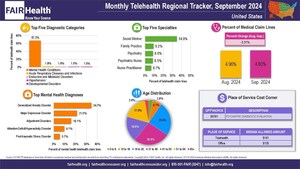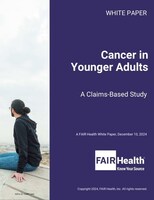Consumers Hungry for Health Insurance Information as Early as High School
Willing to Travel Substantial Distances to Save Money on Treatment for Serious Health Conditions, According to FAIR Health-ORC Survey Report
NEW YORK, Oct. 13, 2016 /PRNewswire-USNewswire/ -- Seventy-six percent of respondents felt the best life stage for consumers to gain an understanding of health insurance was before or during high school or college, according to a national survey commissioned by FAIR Health and conducted by ORC International. Of the respondents favoring insurance education for students, 41 percent felt the education should begin before or during high school. The full survey findings are available in a new report, Healthcare and Health Insurance Choices: How Consumers Decide, with key results highlighted in the infographic below.
At present, health insurance basics are not widely taught either in high school or college. FAIR Health President Robin Gelburd stated, "Our survey results suggest that consumers have a strong appetite for health insurance information to help them navigate the dizzying landscape of healthcare benefits and healthcare choices."
Complexity in Consumer Attitudes toward Healthcare
As consumers take on greater responsibility for managing their own health coverage and healthcare, the survey provides a nuanced window into consumers' attitudes and practices related to those areas. It indicates that consumers regard health-related issues as challenging and complicated. For example, while consumers clearly desire healthcare value, they may lack the requisite information to make decisions involving healthcare economics.
The survey also reveals that the cost of healthcare may prompt some consumers to accept significant inconvenience. Asked how far they would be willing to travel to see a healthcare provider outside their local area if they could save at least 50 percent of the cost of treatment for a serious health condition, 57 percent of respondents were willing to travel 50 miles or more. That total included 39 percent who would travel 100 miles or more. Baby boomers (ages 52 to 70) were nearly as willing as millennials (ages 18 to 35) to make a trip of 50 miles or more.
Yet, when asked how many hours a year they would spend, or have spent, researching various topics, consumers indicated that they spent more time researching a vacation (24.7 hours) than health or dental coverage (23.5 hours) or the choice of a doctor or dentist (19.5 hours). (Responses of zero hours were excluded.) That may be due, in part, to a lack of understandable, accessible information on healthcare pricing comparable to the abundant commercial information available on vacations.
Contrary to the common belief that men tend to ignore symptoms and delay seeking healthcare, the survey also found that men reported spending twice as many hours per year (40.8 hours) as women (20.5 hours) researching health symptoms, diagnoses and treatments.
Asked to name their most trusted source for information on healthcare costs, respondents were divided in their answers. But, 24 percent selected healthcare nonprofits as their most trusted source, just behind the largest group (26 percent), who chose medical groups or hospital organizations.
For the full survey report, click here.
To read more on the survey, here is FAIR Health President Robin Gelburd's blog: "Survey unveils strong appetite for health insurance information-As early as high school."
Follow us on Twitter @FAIRHealth
About FAIR Health
FAIR Health is a national, independent, nonprofit organization dedicated to bringing transparency to healthcare costs and health insurance information through data products, consumer resources and health systems research support. FAIR Health uses its database of billions of privately billed medical and dental claims to power an award-winning free consumer website and to create data products serving all healthcare stakeholders, including government officials, researchers, consumers, providers, insurers and other businesses. FAIR Health has been certified by the Centers for Medicare & Medicaid Services (CMS) as a Qualified Entity, eligible to receive all Medicare claims data for use in nationwide transparency efforts. In addition, FAIR Health's data have been designated as the official data source for a variety of state health programs, including workers' compensation and Personal Injury Protection (PIP) programs, as well as state consumer protection laws governing surprise out-of-network bills and emergency services. For more information, visit www.fairhealth.org.
About the Survey
FAIR Health's survey was conducted April 28-May 1, 2016 by ORC International's Telephone CARAVAN®. The study used two probability samples: landline and mobile phone numbers, both randomly selected. The combined sample consisted of 1,006 adults (18 years old and older) living in the continental United States. The margin of error for the sample of 1,006 is +/- 3.09 percent at the 95 percent confidence level. Support for the survey was provided by the New York State Health Foundation (NYSHealth). The mission of NYSHealth is to expand health insurance coverage, increase access to high-quality healthcare services and improve public and community health. The views presented here are those of the authors and not necessarily those of NYSHealth or its directors, officers and staff.
Contact:
Dean Sicoli
Executive Director of Communications and Public Relations
FAIR Health
646-664-1645
[email protected]
Twitter: @deansicoli
Info - http://photos.prnewswire.com/prnh/20161011/427470-INFO
SOURCE FAIR Health
Related Links
WANT YOUR COMPANY'S NEWS FEATURED ON PRNEWSWIRE.COM?
Newsrooms &
Influencers
Digital Media
Outlets
Journalists
Opted In






Share this article